Dr Susanne Zeedyk Visits
In April 2023, Dr Susanne Zeedyk came to visit the school to see the work and impact the Teddy Bear Policy was having in school. She spoke with pupils and staff, had a tour of the school and joined us for a teddy bear picnic. She was so impressed by what she saw and is keen to use Rosneath as an example for other schools.
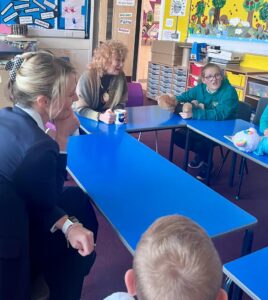

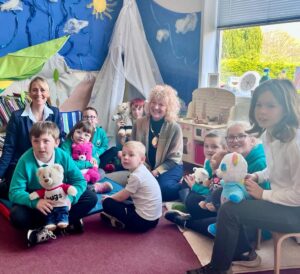
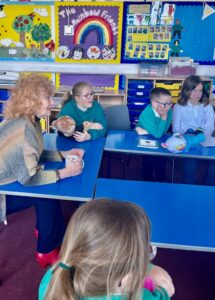
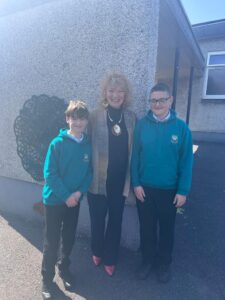
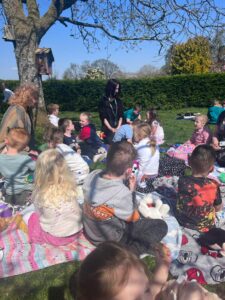

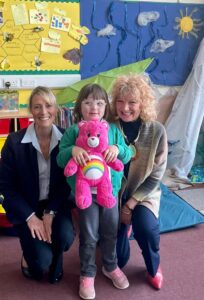
What is our Teddy Bear Policy?
At Rosneath Primary School we have introduced a brand-new initiative to our school. We have introduced a Teddy Bear policy which works alongside the behavioral and relationships policies. In practical terms it involves teddy bears for each P1-7 class but it is about creating space for children to talk and be comforted. Equally important, the learning environment will focus on developing children’s confidence, empathy and self-esteem. The new policy is informed from our further understanding on Adverse Childhood Experiences (ACEs) and Understanding Trauma. The staff have undertaken training on this already.
To ensure the policy meets the needs of our children, parents and staff, we have undertaken surveys to get an idea of the needs and wants of each. We also asked questions about what opportunities there are already to help with health and wellbeing to gauge how these are received currently and how we can improve on them.

What are the Expectations?
Our school community staff agreed they will:
– Ensure everyone is safe, happy and secure.
– Give pupils the best chance for learning, as part of our vision and values.
– Give pupils opportunities to value the power of their voice.
– Work together to create a friendly and welcoming environment for all.
– Provide a safe space for pupils to use the Teddy Bears when they feel they need comfort and support.
Our children agreed they will:
– Care and look after their nursery and class teddy bears.
– Help other pupils who need comfort, in and around our school community.
– Check on one another other, especially those who are sat on the bear benches.
– Use the Teddy bears and benches when they need comfort and support.
– Help look after the bear benches and garden.
Our families agreed they will:
– Give their child a chance to share their day and feelings.
– Support their child in their learning in school and at home.
– Work together with staff to give comfort and support to their child.
RPS Teddy Bear Song
CHORUS
Talk to our little Teddy Bears,
Our lovely little Teddy Bears,
Forget about our worries and our strife.
Chat to our little Teddy Bears,
Our lovely little Teddy Bears
Then they can help us lead a happy life.
VERSE
Whenever we’re lonely,
Whenever we’re blue,
If we have a problem,
We know what to do.
A cuddle from our little bear
Just to show us that they care,
If you are down, they’ll turn it around
Then happiness will come to you and you…….and you and you.
CHORUS
Talk to our little Teddy Bears………………………….
VERSE
If we are unhappy,
If something is wrong,
We’ll talk to our Teddy,
We’ll remember our song.
We know they’re always in our Class
A comfort to us when we pass,
If you’re upset then you can bet,
Your little Teddy Bear will comfort you and you……..and you and you.
CHORUS
Talk to our little Teddy Bears………………………….
Teddy Bear Benches and Garden
Hopefully with support from funding we plan to create a special area with benches and garden space for the children to use. The Bear benches are so the children can sit and chat to friends and do outdoor activities. It is also hoped that if a child is feeling sad they can sit on a bench that indicates they are feeling a little sad and need a hug or a friend to talk to. The garden would be an area that children are able to access during play time and group activities. It would also be an area the children can in time further develop with their own thoughts and ideas. At Rosneath we believe our children’s voices are the most important. We believe by creating a welcoming outdoor area for all our children to thrive, develop and grow in will help foster happy and healthy relationships that will extend outside school.
Teddy Bear Policy Launch
The children were involved in the planning of the launch of the new policy. Some ideas included a teddy bears picnic or a bear hunt around the school grounds. We think it is important for the children to be involved in planning to give them ownership and another chance to have their voice heard in school.
What is the Background on creating a Teddy Bear Policy?
The idea of a Teddy Bear Policy comes from research completed by Dr Suzanne Zeedyk on Attachment and talks about Sabre Tooth Tigers and Teddy Bears.
What is Attachment?
Attachment is the biological need that all babies are born with that drives them to bond with their caregivers. The immature nature of human brains means that babies can’t handle emotions on their own, so they need the help of other people. That’s why brains are born immensely observant. Babies notice the facial expressions, bodily movements and responsiveness of other people. They are much more observant than most people imagine and certainly more observant than adults.
A baby’s brain needs that power of observation. It is trying to work out the best ways of getting parents’ help and attention. Babies feel like they need that attention a lot! And they really really do. They can’t feel safe without it.
Babies have lots of strong emotions – fear, joy, frustration, disappointment, surprise, anger, boredom, discomfort, loneliness. Any of those emotions can become overwhelming for them. That’s why they need a caregiver’s help. The adult can help to ‘contain’ those emotions, so that the baby isn’t left handling the feelings on their own.
With help, and over time, the baby’s body and brain develop the capacity to handle strong emotions. This is called ‘self-regulation’. Attachment is the process that helps a child to grow a strong self-regulatory system. Without the ability for self-regulation, mental health problems develop, as well as physical health problems and behavioural difficulties.
Why Sabre Tooth Tigers and Teddy Bears?
The language of Sabre Tooth Tigers & Teddy Bears captures two key insights that the science of attachment has discovered over the past several decades.
The first is the frequency of babies’ anxieties. Babies can be scared of all sorts of things that surprise grown-ups. They are scared of being left alone in the hallway. They are scared when a stranger leans in too close, even if she’s smiling. They get scared if they can’t find you because you are behind them, pushing the buggy.
Talking about ‘Sabre Tooth Tigers’ helps to remind adults of such anxieties. The fear comes from long ago in our evolutionary past, when predators like tigers roamed villages. Babies, who can’t yet run away from predators, needed to be able to call on someone to come and help. That’s what kept them alive! The ability to get someone to come and help when you are feeling scared is part of the baby’s survival system.
The second insight from the science of attachment is the importance of comfort. That’s captured by the reference to ‘Teddy Bears’. All of us know that the whole point of a teddy bear is to provide reassurance.
Responsive attention from parents and other key adults helps a baby to grow an ‘internal teddy bear’. It helps babies to develop a self-regulatory system that will last throughout life, which will be good at keeping them calm, even in moments when strong emotions are swirling. This capacity to remain calm will be important throughout their life! It will guard against mental and physical health problems, and will prevent relationship difficulties.
What are we hoping to achieve?
For lifelong learning to take place, the environment needs to be right and that means ensuring our children feel happy, safe, and secure. It is hoped by raising children confidence and self-esteem. This will in turn have an impact on raising educational attainment.
It is hoped that our new policy will lead to:
- A decline in disruptive behaviour.
- An increase in kindness and empathy amongst children.
- Children feeling more included and able to work together.
- A clearer more expressive ‘children’s voice’.
All these have a positive impact on attainment and in turn will prepare our children for the best start in life, particularly for those children who have experienced ACEs and trauma.
Part of our school’s values and vision is “Learning with a happy heart and healthy relationships”. An aspect of this is promoting Health
and Wellbeing for all and ensuring children have access to a stimulating outdoor environment is important in ensuring children’s basic needs are met. The curricular outcomes that would be met include:
· “I understand positive things about friendships and relationships but when something worries or upsets me I know who I should
talk to.” HWB 0-44b / HWB 1-44b.
· “I am aware of the need to respect personal space and boundaries and can recognise and respond appropriately to verbal and non-verbal communication.” HWB 0-45b / HWB 1-45b / HWB 2-45b
We believe by giving our children ownership of our Teddy Bears, the benches and garden we feel that they in turn will be responsible citizens,
effective contributors in our society, confident individuals and independent learners. The policy will also connect to the work we are doing on Rights Respecting Schools and ensuring pupils’ rights are met.
